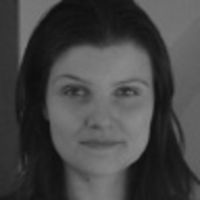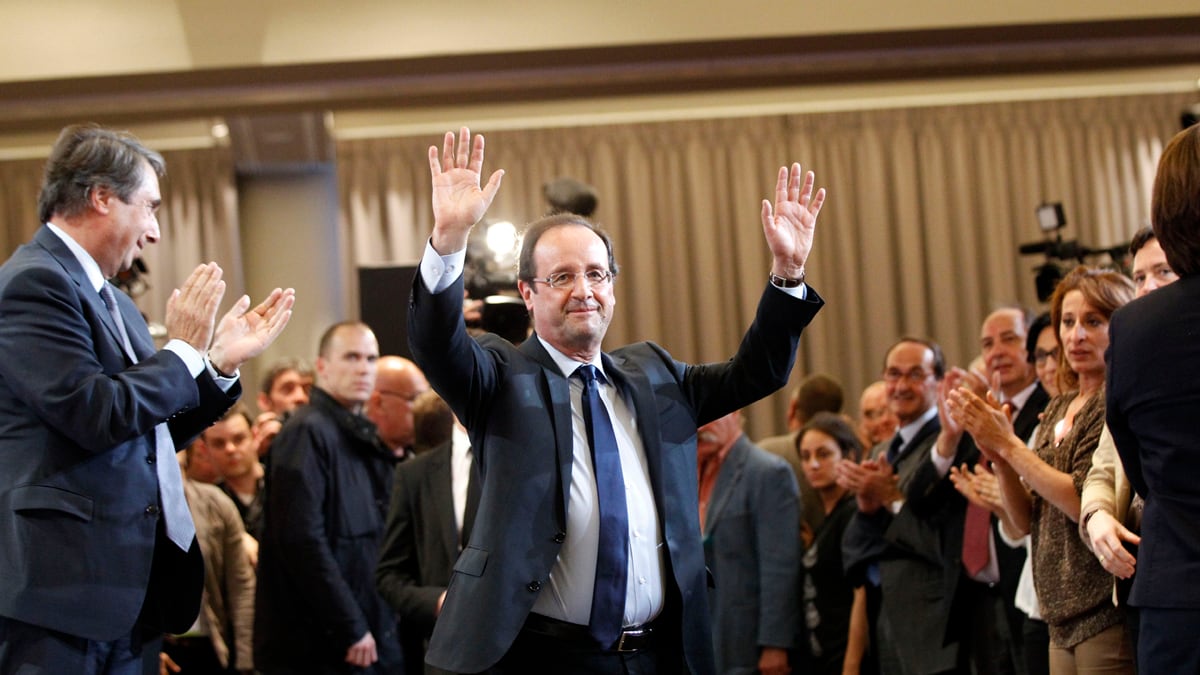In a few hours of pageantry in Paris today, before the real work begins, François Hollande officially became president of the French Republic, the second Socialist ever to win the role. On the red-carpeted front steps of the Élysée Palace, the new leader sent off Nicolas Sarkozy with a cordial handshake, as France's new first lady, the journalist Valérie Trierweiler, said au revoir to her own predecessor, Carla Bruni-Sarkozy, with a two-cheeked kiss.
The deliberately un-Sarkozy new president has promised to lead with simplicity, to be open and close to the people. But for a moment at least, on his very first day in office, wild weather in Paris put those promises to a tough test. In an open-roof car, a hybrid Citroën DS5, a sodden Hollande stood through the beating rain, without umbrella or overcoat, his suit glistening as drops pooled on his shoulders, his eyeglasses fogging, waving to supporters along the Champs Élysées.
As he stood beneath the Arc de Triomphe to rekindle the flame at the tomb of the unknown soldier, with a military band playing “La Marseillaise,” the French national anthem, Hollande's wet, white, and now see-through shirt clung to his chest. His tie sat a little crooked, the right cuff of his shirtsleeve stuck out of his jacket from all the waving, and rain dripped from his ear. This may be the calm before the storm for a president who takes office as economic crisis continues, but the rain brought drama to a deliberately solemn and sober power handover in France.
Earlier, in his investiture speech at the Élysée Palace, in the gilded festival hall where every new French president is invested under frescoes of cherubim, Hollande emphasized the challenges ahead. "I measure the weight of the constraints we are facing: massive debt, weak growth, high unemployment, degraded competitiveness, and a Europe that is having trouble exiting the crisis." But Hollande said French strengths and assets could carry the country through it, in a speech ultimately designed to inspire confidence. And he paid his respects to his predecessors, complimenting them all, from Charles de Gaulle to Jacques Chirac, and merely wishing Nicolas Sarkozy, the man he defeated May 6, well in his new life beyond the palace.

The president-elect arrived alone at 10 a.m. sharp, greeted by Sarkozy on the red carpet in the Élysée Palace courtyard, for a traditional handover chat with the outgoing leader, which lasted 38 minutes behind closed doors. France's new first lady, Valérie Trierweiler, too, arrived alone, in a white coat over a black dress. Indeed, neither Hollande's four children from a previous union with former Socialist presidential candidate Ségolène Royal (also absent), nor Trierweiler's three teenage boys attended the ceremony.
It was yet another difference Hollande chose to mark with Nicolas Sarkozy's flashy presidency. In 2007, when Sarkozy was invested, the appearance of his catalogue-worthy blond brood—a modern family of step-siblings, his second wife Cécilia, their young son Louis, his two other boys and her two girls from previous unions—was compared to the arrival of movie stars on the famous steps of the Cannes Film Festival. Hollande's personal guest list was deliberately thin. It included former Socialist prime ministers and 10 French Nobel Prize winners.
The new French president continued his first day in office with homages to symbolic figures in French history. Beyond the tradition of rekindling the flame at the tomb of the unknown soldier, Hollande chose two figures in keeping with his campaign emphasis on youth. To the squeals of middle-school children invited to watch, he laid a wreath (in brilliant sunshine) in the Tuileries Gardens at the statue of the 19th-century educator Jules Ferry, who is credited with making school in France secular, co-ed, and free for all. Minutes later, under a sudden hail shower on the Left Bank, Hollande laid a second wreath at the foot of a monument to Marie Curie, the Polish-born Frenchwoman who was twice awarded the Nobel Prize, in physics and chemistry, in the garden of the institute that bears Curie's name. At every stop, rain or shine, Hollande sought out contact with crowds of well-wishing strangers, indulging in hugs, handshakes, two-cheek kisses, and smartphone photos, as Trierweiler looked on.
Three suit jackets later, Hollande's long first day continued with a ceremony at Paris city hall, another tradition for new French presidents, during which he paid tribute to the capital and asked that Paris always remain Paris.
Now, the real work begins. This evening, Hollande heads to Germany for his first trip abroad—another French tradition—for a meet-and-greet dinner with Chancellor Angela Merkel, amid a backdrop of disagreements over austerity. Don't expect fireworks, at least not yet (although Hollande's plane to Berlin was struck by lightning minutes after takeoff, and he had to double back to Paris for another plane—that's the kind of weather day it's been for the new French president). Merkel has said she would greet Hollande "with open arms," and he has struck his own conciliatory notes. Indeed, as the new French president's motorcade made its way to a military airport for the trip to Berlin this afternoon, the Élysée Palace named his new prime minister, Jean-Marc Ayrault, an experienced parliamentarian who is also a German professor by training and known for his keen sense of France's crucial neighbor across the Rhine River. One way to start building bridges in the tempest.





